Five Things a Lawyer Wants You to Keep in Mind After the Death of a Loved One

No matter why your loved one has passed away, it can cause a lot of stress. It's stressful if you're in the middle of a proceeding, like waiting for a 9/11 Victim Compensation Fund ruling, it’s stressful if there is a ton of belongings to go through, and it’s stressful if you’re stuck trying to hunt down important information, like a life insurance policy or account passwords. Of course, all that is in addition to the stress ofsimply losing someone you care about.
Lawyers can be hugely helpful after the passing of a loved one, not only as the executor of the estate, but also because they have a lot of tips that can make the technical details of dealing with a loved one’s death a little easier.
Power of Attorney Ends at the Moment of Death
Having a power of attorney is extremely important. It ensures your wishes are carried out if you should ever find yourself incapacitated. Unfortunately, it isn’t all that uncommon for families to make the mistake of thinking that if they have a power of attorney there is no need for an executor of their estate.
The difference between a power of attorney and an executor is that the first has the power while your loved one is alive, while the other has the power after death. Once your loved one passes away, power is transferred to the executor of the estate. It’s important to have both to ensure things go smoothly.
There Will Be Family Members Who Will Make Things Complicated
Most families have at least one member that can be expected to cause trouble at family gatherings. It’s usually the case that they will cause trouble after your loved one dies, but even relatively harmonious families experience problems after a death in the family.
It’s normal for sibling relationships to be strained, and you shouldn’t be surprised if a far-flung family member wants to get in on your loved one’s estate after their passing. Having an attorney can help ensure relationships aren’t destroyed over the passing of someone in your family.
Estates Are for Everyone, Even Those Without a Lot of Money
Many people, especially those who don’t have a lot of money, don’t create an estate. This is a mistake. Everyone needs an estate plan. Not only does it divvy up money and belongings, it also includes important information and documents like:
- Bank account information
- Safe deposit box information
- Retirement plan information
- Instructions for final arrangements
- Tax information
- Insurance policies
Fortunately, an estate can be opened through the probate process after the death of your loved one if they didn't have one beforehand. It will help keep creditors at bay.
Those Left Behind Are Usually Not Responsible for Debts Tied to the Estate
Not all of us are lucky enough to be left with a long list of assets and full bank accounts when a loved one passes. Instead, many family members find themselves staring down a mountain of debt their loved one was responsible for that they didn’t pay.
The good news is that in most cases, you are not responsible for your loved one’s debts. Instead, those debts follow the estate. However, there are some exceptions. In some states, spouses are responsible for repaying debts incurred by a deceased spouse, while cosigners on loans will almost certainly be expected to continue making payments even if the primary loan holder has passed away.
Make Sure You Obtain a Death Certificate
As with most important things in life, death comes with a certificate. It may seem strange to collect a certificate of death for a loved one, but it is important to have at least one so you can close the estate effectively.
With a death certificate, states know to stop social security payments, pensions, and other benefits. That way you aren't punished later because you collected payments that don’t belong to you. It is often also needed when dealing with certain accounts, like life insurance or retirement accounts. If you don’t get a death certificate or you lose the one you received, contact the Department of Vital Records for another one.
Unfortunately, there’s a lot more to do after the death of a loved one than to mourn. From dealing with debts to troublesome family members, there are a lot of road bumps that can be made easier when you are prepared with the tips on this list.
More to Read:
Previous Posts:










